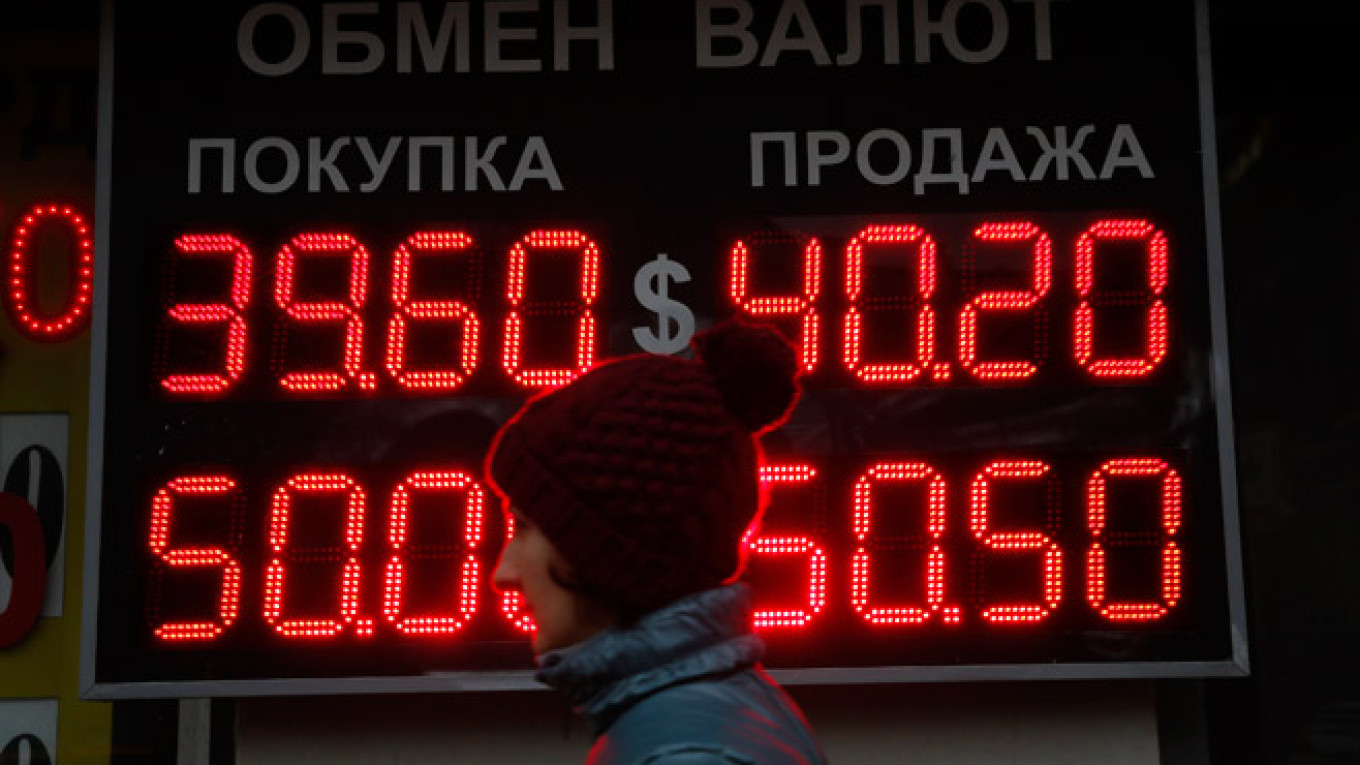Russia's Central Bank intervened to defend the ruble on Tuesday after the currency again breached the bank's trading band, as companies starved of foreign currency because of sanctions continued to show robust demand for dollars.
The Russian currency has been battered for months by falling oil prices and risk aversion towards Moscow-listed assets due to the crisis in Ukraine, and the Central Bank has repeatedly defended the ruble in the past week.
The Central Bank automatically intervenes at the edges of the ruble's trading band against a dollar-euro basket, which stretched from 35.60 to 44.60 as of Monday. Once it spends $350 million defending the currency, the bank shifts the band by 5 kopeks.
"Judging by the prices, the corridor was moved [again today]. This was caused by the resumption of foreign currency purchases from the Central Bank," said Igor Akinshin, a forex trader at Alfa Bank.
"The local demand for foreign currency is constant, but yesterday people sold the dollar given world trends. We also had dollar sales yesterday once it reached the 40 [rubles to the dollar] mark. But that's all been bought up, and now the market is going back to the Central Bank," Akinshin said.
Western sanctions shutting major Russian banks and firms out of international capital markets have driven sharply higher demand for overseas currency, which large Russian firms need to meet external debt obligations.
The ruble was trading 0.5 percent weaker at 39.96 against the dollar at 7 p.m., close to an all-time low touched on Monday.
It was down 0.2 percent at 50.4 versus the euro. That left the ruble 0.4 percent lower at 44.66 against the dollar-euro basket the Central Bank uses to gauge the ruble's nominal exchange rate.
The Central Bank has shifted the ruble's trading band by at least 20 kopeks since Friday. It said on Tuesday it had spent $980 million defending the ruble on Oct. 3 but is yet to release data for the amount it has spent since the start of the week.
Russian shares also lost ground on Tuesday, reversing strong gains of over 2 percent made in the previous session.
"Yesterday's rise was clearly driven by people closing short positions, but after that the market started to slip back under its own momentum. I don't see any signal for purchases yet," said Alexei Surov, an equities trader at Bank Zenit.
At? the dollar-denominated RTS index was down 1.2 percent to 1,107 points, while the ruble-based MICEX was down 1 percent at 1,403 points.
Oil, one of Russia's chief exports, edged lower on Tuesday, with the front-month futures contract for benchmark Brent trading around $92.5 per barrel.
A Message from The Moscow Times:
Dear readers,
We are facing unprecedented challenges. Russia's Prosecutor General's Office has designated The Moscow Times as an "undesirable" organization, criminalizing our work and putting our staff at risk of prosecution. This follows our earlier unjust labeling as a "foreign agent."
These actions are direct attempts to silence independent journalism in Russia. The authorities claim our work "discredits the decisions of the Russian leadership." We see things differently: we strive to provide accurate, unbiased reporting on Russia.
We, the journalists of The Moscow Times, refuse to be silenced. But to continue our work, we need your help.
Your support, no matter how small, makes a world of difference. If you can, please support us monthly starting from just $2. It's quick to set up, and every contribution makes a significant impact.
By supporting The Moscow Times, you're defending open, independent journalism in the face of repression. Thank you for standing with us.
Remind me later.


